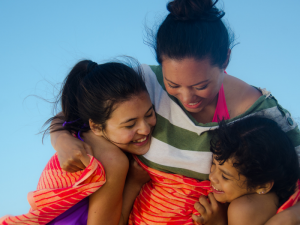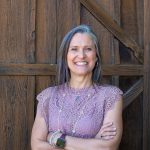
Catholic Identity for Unity & Peace
May 12, 2022

In the recent document The Identity of the Catholic School for a Culture of Dialogue, the magisterium quoting Pope Francis attests, “We cannot create a culture of dialogue if we have no identity.” Elaborating further, the pope continues, “Only a strong and unitary action of the Church in the field of education in an increasingly fragmented and conflictual world can contribute both to the evangelizing mission entrusted to her by Jesus and to the construction of a world in which men and women feel like brothers, because ‘we are convinced that only with this awareness of children who are not orphans can we live in peace among ourselves’” (7). In other words, if we do not have a strong, unified identity, we cannot have peace.
How does a strong unified identity lead to peace? What does Ruah Woods Institute’s mission and the Theology of the Body have to do with this notion? Let’s explore!

The promulgated maternal image of the church is essential because this representation helps us to see the church not only as tender and loving, “but also preserves the strength to be a guide and teacher.” When we see the church as a tender, loving, strong guide and teacher, the whole attitude of receptivity to what the church has to protect and relay (directly rooted in divine revelation) begins to grow. There is a common misconception in our world that the church is essentially a bunch of outdated and irrelevant rules that only serve to make our lives difficult. This simply isn’t true. The core cause of this misconception is that we do not have a proper understanding of our Christian Anthropology, in other words, we don’t know who we are. If we can see the church as a nurturing mother who wants to help us distinguish who we are, then our identity, our authentic identity, can begin to be discovered.
The magisterial document further challenges, “The Church has the duty to educate ‘above all because she has the task of proclaiming to all men the way of salvation and of communicating to believers the life of Christ, helping them with unceasing solicitude to attain the fullness of this life. To these children of hers, therefore, the Church as mother must give such an education that their whole life is penetrated by the spirit of Christ‘ [emphasis added].” Isn’t this why we send our children to Catholic school? The entire environment should be permeated to form the students in a lifelong sacramental worldview. Remember, also, Jesus Christ himself proclaimed, “I came that they might have life and have it abundantly “(John 10:10). Jesus wants us to not just survive but to live abundantly. The universal church that He established for everyone does too. But, like anything else in our lives, abundance doesn’t come without self-sacrifice, without courageously doing hard things, without strenuous work.

This arduous work we must do is within our own hearts. We cannot have a Catholic identity if we are not doing continual work on ourselves. The document goes on to assert, “Another fundamental element is the initial and continuing training of teachers … they must … prepare scrupulously … Close to each other and to the students by the bond of charity and rich in apostolic spirit, they must bear witness both with their lives and with doctrine to the one Teacher who is Christ” (14).
How does Ruah Woods Institute’s K-12 Theology of the Body curriculum and educator formation/training help schools and parishes with this responsibility? Quite simply, our new TOB Campus continual educator formation process, helps educate teachers on their own Christian Anthropology, and guides them in sharing these fundamental, objective truths with their students as genuine witnesses. Our beautiful curriculum is a vehicle to help the students to understand who they are as a son or daughter of God, made in His image with inherent dignity as well as a plan and purpose. Bearing in mind, who we are informs us how to act, we cannot know or impart how to act if this fundamental understanding of identity is not clear, unified and strong; based on rational tenets, and natural law through our Creator’s “blueprint” for us.

There are many testimonials on our website from educators whose schools have integrated our amazing TOB curriculum and have further committed to aspiring to be a TOB Campus, that have experienced a profound change in the entire culture of their school. When the students look to mother church for guidance and tender love instead of viewing her as just an irrelevant rule-giver, their entire worldview changes and “…their whole life is penetrated by the spirit of Christ.” They look for opportunities to be a gift-of-self to their teachers, classmates, and families. Being a son or daughter of God, discovering their vocation, uplifting marriage, family and the inherent dignity of the human person become integral to their understanding of who they are and whose they are. Once one’s authentic identity is firmly rooted in the truth, beauty and goodness of TOB, one’s actions will more easily follow accordingly. Every Catholic school has the responsibility to shore up their Catholic identity by learning and teaching these foundational Theology of the Body scriptural reflections in a culture that has lost its way in the understanding of who the human person is created to be, leading us to the peace we all desire.

Written by,
Kathleen Cory,
Regional Curriculum Consultant (South) for Ruah Woods Institute
kcory@ruahwoods.org
Share